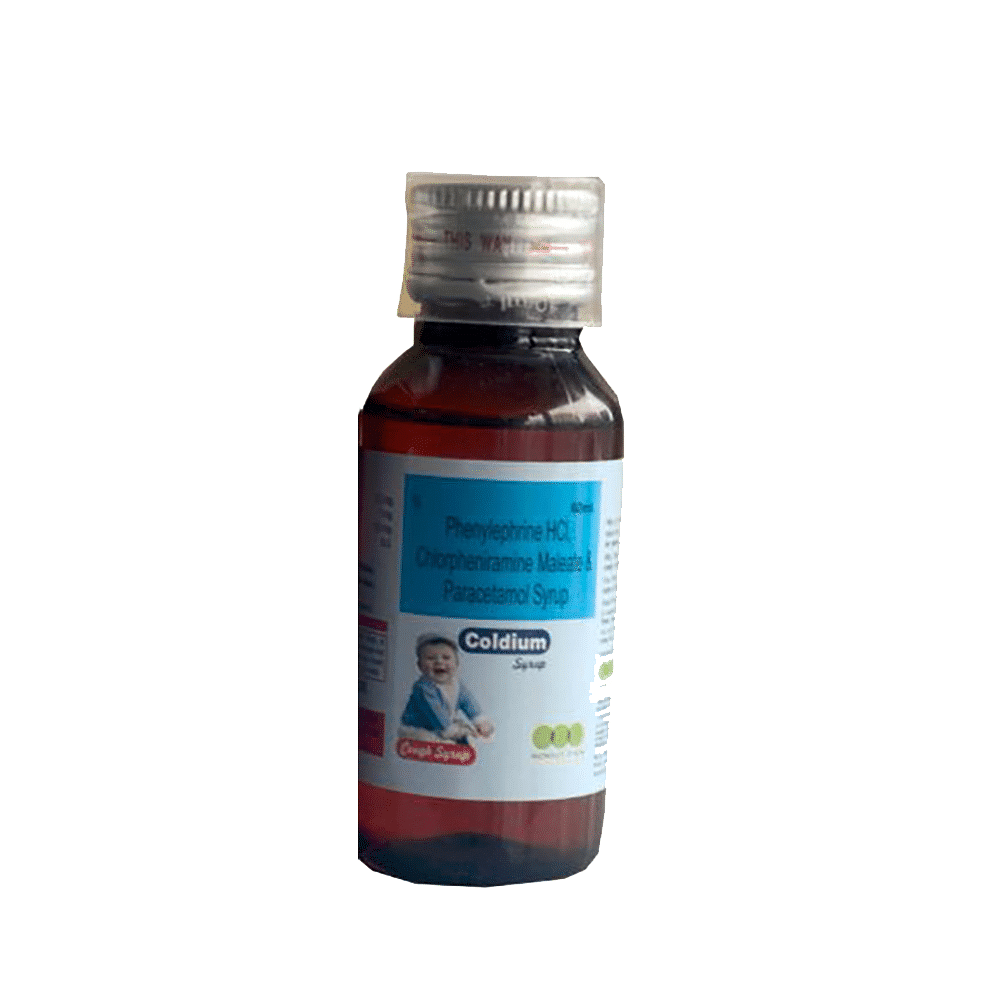
Coldest Syrup
Manufacturer
Meddox Formulations
Salt Composition
Chlorpheniramine Maleate (2mg/5ml) + Paracetamol (15mg/5ml) + Phenylephrine (.5mg/5ml)
Key Information
Short Description
Coldest Syrup is commonly prescribed in children to treat symptoms such as runny nose, cough, sneezing, watery eyes, sore throat, body ache, and fever.
Dosage Form
Syrup
Introduction
Coldest Syrup is a combination of four medicines: Chlorpheniramine Maleate, Phenylephrine, Paracetamol, and Sodium Citrate, which relieves common cold symptoms. It is commonly prescribed in children to treat symptoms such as runny nose, cough, sneezing, watery eyes, sore throat, body ache, and fever. These symptoms are usually associated with common cold, hay fever (allergic rhinitis), and other respiratory tract conditions.
Directions for Use
Coldest Syrup may make your child feel sleepy. Ensure your child takes extra care when taking part in physical activities. Never combine Coldest Syrup with other cold and flu medicines as that may lead to side effects. Stop Coldest Syrup and immediately report to the doctor if your child develops an itchy rash, facial swelling, or breathing difficulties.
Safety Information
Side Effects
No common side effects listed
How it works
Coldest Syrup is a combination of four medicines: Chlorpheniramine Maleate, Phenylephrine, Paracetamol, and Sodium Citrate, which relieves common cold symptoms. Chlorpheniramine is an antiallergic that relieves allergy symptoms like runny nose, watery eyes, and sneezing. Phenylephrine is a decongestant that narrows the small blood vessels providing relief from congestion or stuffiness in the nose. Paracetamol is an analgesic (pain reliever) and an antipyretic (fever reducer). It blocks the release of certain chemical messengers in the brain that are responsible for pain and fever. Sodium citrate is a mucolytic that thins and loosens mucus (phlegm) making it easier to cough out.
Quick Tips
Ensure your child takes extra care when taking part in physical activities Never combine Coldest Syrup with other cold and flu medicines as that may lead to side effects Stop Coldest Syrup and immediately report to the doctor if your child develops an itchy rash, facial swelling, or breathing difficulties Practice self-care tips: Clean and disinfect surfaces after sneezing and coughing to avoid allergy, give your child plenty of fluids, restrain your child from having caffeinated products and foods that are spicy and fried, make your child gargle with warm saltwater, and ensure your child takes enough rest
Related Medicines

Yuvicold Syrup

Wentcold Syrup

Smatoxtif Syrup

Pcan-P Syrup

Magacold Syrup

Histadol Syrup

Razcold Syrup

Finecold Plus Syrup

Coldium Syrup

Pencold Syrup
Frequently asked questions
What happens if you give too much Coldest Syrup by mistake?
Taking more than the recommended dose of Coldest Syrup can lead to serious side effects such as seizures, rapid heart rate, depression, cognitive defects, and inability to concentrate. Always use the calibrated cup provided with the medicine to ensure the correct dose.
Can other medicines be given at the same time as Coldest Syrup?
Coldest Syrup may interact with other medications or substances. Inform your doctor about any other medications your child is taking before starting Coldest Syrup, and consult their doctor before giving any additional medicine to your child.
What medical conditions should I avoid giving Coldest Syrup to my child?
If your child has a history of cardiovascular disease (hypertension, heart disease), diabetes mellitus, gastrointestinal obstruction, increased intraocular pressure, urinary obstruction, or thyroid dysfunction, consult with their doctor before administering Coldest Syrup.
Can I give my child two different cough and fever medicines together?
Do not give your child more than one cough or cold medicine at a time unless advised by the doctor. This is because both medications could have the same ingredients, leading to an overdose and potentially serious consequences for your child.
Can I give my adult cough medicine to my child?
Never give your child medicines intended for adults, as this can cause unwanted side effects. Ensure you provide your child with the correct medication formulated specifically for their age group.
Will Coldest Syrup make my child sleepy?
Coldest Syrup may cause mild drowsiness, but it's essential to use it only when necessary and not as a means to induce sleep. This can mask underlying sleep disorders such as insomnia.
How should I store Coldest Syrup?
Store Coldest Syrup at room temperature in a dry place, away from direct heat and light. Keep all medications out of reach and sight of children to avoid accidental intake.


